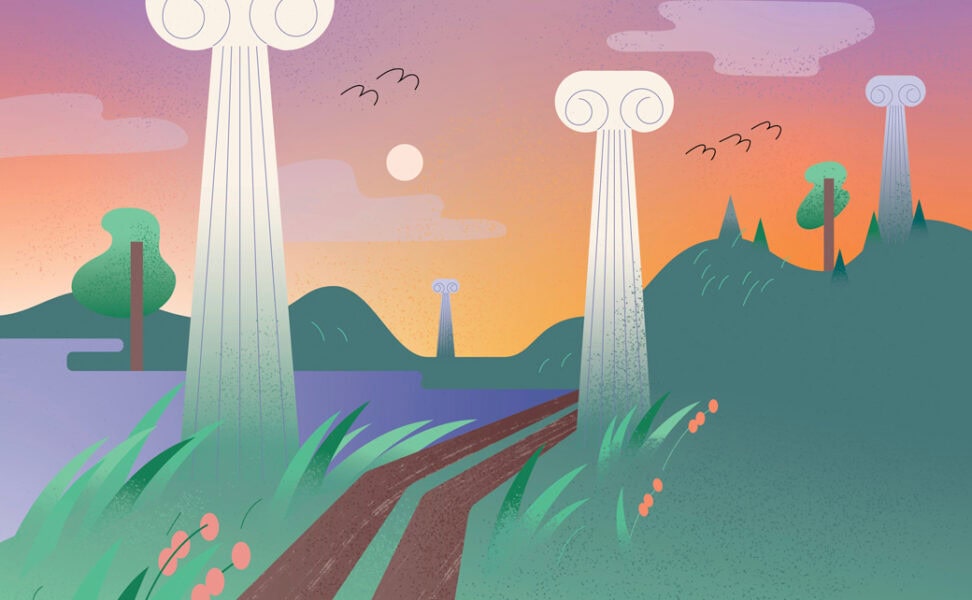
Possible futures
Professors outlined their thoughts on the future of science, and it tells of the present of science.
Text MIKKO PELTTARI Images AARNI KORPELA
“Brains are leaking, but global collaboration is paying off. We must compete for
the brains.”
This is how one person, quoted in a report by the Finnish Union of University Professors, imagines the future. In the next few years, we will indeed see a new kind of
digital brain drain, if we are to believe the report, “Into the Future with Knowledge”. In the past, high-quality daycare, the school system and a stable society in general have kept researchers at Finnish universities, but what if one’s place of residence is less and less important in this era of remote working and high connectivity?
On the other hand, more people living in India or America, for example, may work at Finnish universities in the future.
“Digitalisation could make research work more accessible to, for example, people with physical or other barriers.”
Sanna Ahvenharju, a researcher at the University of Turku
“Digitalisation could make research work more accessible to, for example, people with
physical or other barriers. And if the research community becomes more diverse, so will research topics,” says Sanna Ahvenharju, a researcher at the University of Turku and the main author of the report.
It was no surprise that the effects of digitalisation were hotly debated when persons were asked about the future of science during the corona pandemic – when the trend of digitalisation finally became the new norm.
RESEARCHING THE FUTURE
For the report, 18 perspectives on the future of science were presented to the members of the Finnish Union of University Professors and other stakeholders, who then provided evaluations and comments. Of the 444 responses, 400 were from professors. The baseline questions were prepared by Ahvenharju and her colleagues.
“Whereas research usually starts with a literature review, futures research maps the operating environment. We look for signals and trends about essential developments in the current debate,” says Ahvenharju.
Based on these responses, 10 arguments were evaluated at workshops, which were
attended by 30 people. The resultant report raised 8 futures-related themes considered
particularly important.
“Futures research sometimes looks at a few possible futures, but we wanted to present as many options as possible in this study,” says Ahvenharju.
CONCERNS ARE HIGHLIGHTED
“Current performance management has also led to the fact that, even if the sector is important from the point of view of short-term interests, if it is also difficult/complex, its funding will dwindle.”
Respondents to the report raised numerous concerns.
“Professors are critical, and in studies like this one, threats are highlighted,” Ahvenharju reminds us.
“If it had been a longer study, it would have been interesting to refine these questions in the direction of dreams and hopes.”
Study participants spoke about the funding of science, the escalation of international politics and various assessment-related issues. Concerns were raised about how funding and success metrics drive science: on the one hand, academic trends distort incentives, and on the other hand, interdisciplinarity can be a barrier to career advancement – publications with the highest impact factor don’t always welcome a multidisciplinary approach.
“If it had been a longer study, it would have been interesting to refine these questions in the direction of dreams and hopes,” says Ahvenharju.
SURPRISES AND PRESUMPTIONS
“Energy is a limiting factor globally. Now that we are immersed in these virtual environments, everything is big data and blockchain, and we are eating huge amount of energy. At the same time, everything has to be sustainable.”
When asked about the future, it is no surprise that robotics, artificial intelligence and
digitalisation are on the agenda. According to Ahvenharju, one new idea was that, in the future, natural resource issues and scarcity of resources could guide science.
“Climate change and loss of biodiversity were mentioned as major concerns, but they
may have been seen more as research subjects. That’s why it would be interesting to think further about how they can change the ways science is done,” says Ahvenharju.
It is important to know how science works.
Another important issue is the role of science in society. It made people speak up in both open-ended responses and workshops, asking: What creates the distrust fuelled by social media and the avalanche of conspiracy theories and disinformation?
According to the report, it is important to know how science works. Otherwise, disagreement among scholars on different issues threatens to create misunderstandings. Ahvenharju also reminds us of the importance of communication methods: the pandemic has underlined the fact that, even though researchers may sometimes disagree, findings should not be easily branded as hoaxes.
“The survey raised strong concerns about whether the scientific community has shared ways of dealing with false information and anti-science,” Ahvenharju reflects.
“However, there has been little discussion about how to meet this challenge.”
Quotes in italics are from respondents to the report. “Into the Future with Knowledge” can be read online at professoriliitto.fi.
Researcher of futures consciousness
Sanna Ahvenharju previously prepared a report on foresightedness for the Parliamentary Committee on the Future and has worked as an expert in public and private environmental administration. Now Ahvenharju is finalising her dissertation on futures consciousness at the University of Turku. Futures consciousness describes the tendencies with which people make assumptions
about the future. Its components are: the distance at which the future is perceived, whether the future is believed to be influenced by oneself, whether it is open to different possibilities, whether the connections between
different systems are understood and how the future of others is considered, if at all.
“I think the benefit of this report lies in developing awareness for the future. Researchers and professors could consider in their own work environments whether these questions are essential and in which directions they could
open up new ideas,” says Ahvenharju.

